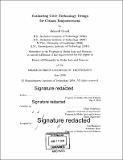Evaluating civic technology design for citizen empowerment
Author(s)
Graeff, Erhardt (Erhardt Charles)
DownloadFull printable version (19.08Mb)
Other Contributors
Program in Media Arts and Sciences (Massachusetts Institute of Technology)
Advisor
Ethan Zuckerman.
Terms of use
Metadata
Show full item recordAbstract
Civic technology should empower us as citizens. Despite its breadth as a field, civic technology often takes its lead from Silicon Valley companies that espouse design goals potentially hazardous to participatory democracy. In this dissertation, I explore: How might we design civic technologies for citizen empowerment and evaluate their impact on this goal? With their growing role as mediators of democracy, it is insufficient for civic technology designers to evaluate their designs in terms of ease of use and increased engagement with their platform. Research from political and developmental psychology shows the importance to lifelong civic engagement of learning experiences that cultivate a citizen's perception they can make change (political efficacy) and their belief in having responsibilities to the public good (civic identity). To achieve these positive feedback loops, we need a richer framework for civic technology design. This dissertation proposes two solutions: 1) empowerment-based design principles for civic technology and 2) a prototype toolkit for evaluating the impact of civic technology on political efficacy. Because empowerment is contextual, the proposals here focus on tools and platforms built to support "monitorial citizenship," an increasingly popular form of civic engagement aimed at holding institutions accountable. To see these solutions in action, I report on a case study of SeeClickFix, a civic technology company that builds tools enabling citizens to report infrastructure problems to local governments. Two surveys of political efficacy and a randomized experiment with active users of SeeClickFix, followed by interviews with SeeClickFix staff, indicate the validity and utility of evaluating political efficacy as a measure of empowerment as well as the limitations of testing for incremental improvements.
Description
Thesis: Ph. D., Massachusetts Institute of Technology, School of Architecture and Planning, Program in Media Arts and Sciences, 2018. Cataloged from PDF version of thesis. Includes bibliographical references (pages 193-214).
Date issued
2018Department
Program in Media Arts and Sciences (Massachusetts Institute of Technology)Publisher
Massachusetts Institute of Technology
Keywords
Program in Media Arts and Sciences ()